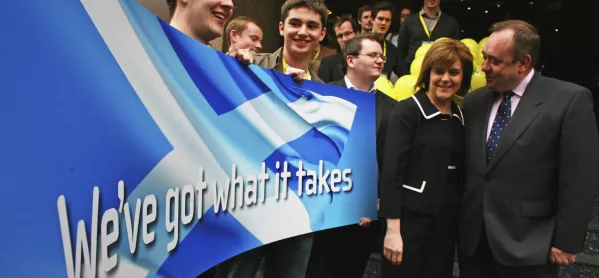For centuries, the Scottish education system has been admired, so what exactly would the effect be of an SNP tartan rubber stamp on education policies from the two potential governmental parties in Westminster through to the next election in 2020?
If Labour walk into Number 10, one can envisage some manifesto promises being met only with mild surprise that it’s taken so long. Their promise that the main classroom teacher will from now on always be fully-qualified has been a norm in Scotland since the turn of the century. SNP politicians have invested deeply in the understanding that initial teacher education and some significant time teaching in a real classroom makes up the starting block for quality.
On the contrary, the Conservatives’ desire to bolster teacher numbers south of the Border through increased support for Teach First is anathema to the Scottish way of doing things. The SNP’s track record points instead to making a long-term investment in its people, investing the cash into the coffers of initial teacher education, for people who show at the outset that their intention is to be a teacher, for life.
Achieving that long-term investment in education’s workers is as much about the means, as committing to it in the first place. Labour’s “Master Teacher” and the parties’ backing of a “College of Teaching” smack of the now-abandoned Chartered Teacher Programme in Scotland. The programme’s goal was laudable - keep great teachers in the classroom teaching, with more action research and a salary to match - and there was evidence that these ‘super teachers’ were having a more positive impact on learning. Alas, most local authorities found themselves in a logistical and budgetary nightmare, unable to plan for significantly higher salaries of teaching staff. That, plus a lack of support from the Unions, was enough to kill the Chartered Teacher programme barely a decade after it had been conceived. The SNP would be loathe to approve budget in England for a policy they’ve just been forced to abandon.
Instead, we might see SNP support for further investment in educational leadership - the Scottish College for Educational Leadership and a now-mandatory master’s for headship for all aspiring leaders represent a significant investment in the belief that strong leadership is, above all, what will close the achievement gap.
The key policies, though, that will appeal to the vast majority of voters - the parents - are those likely to produce the meatiest bones of contention were the SNP to have any power of persuasion on in England’s DfE. Class sizes in England remain woefully large compared to the fewer than 25 in your average Scottish early years environment. Labour’s effort to get it down to just 30 in England, and the Conservatives’ body-swerve of the issue in its entirety, are in stark contrast to the SNP’s educational ambitions.
Labour’s desire to recreate Sure Start and provide 50,000 extra places might also be seen as falling too short of what is required to genuinely “give every child a good start”. Pre-school learning in Scotland will be guaranteed at 30 free hours per week by 2020 for all children, up from 16 today - neither Conservative nor Labour manifestos make any promises, or even mentions, of these kinds of specifics.
The Conservatives will face resistance, too, from Scottish MPs in a country where no ‘serious’ testing of children begins until they’re around 14 years old. So, a Tory promise to bring in an end-of-primary school test on literacy and numeracy (and make kids resit it two months later at the start of secondary school if they fail it) might well be laughed off the backbenches.
But it is the Conservatives’ lead manifesto commitment to create more schools run outside the education system that will face greatest resistance from any SNP seats: the rapid expansion of free schools, run by parents and other community members, and a continued tsunami of the state-financed, independently-run Academies, are diametrically opposed to what the SNP stand for. Of Scotland’s 2400 schools, only one is publicly funded and run outside the system through a 1920s historical quirk: the enigmatic Jordanhill School in Glasgow.
In Scotland, it is an article of faith that a great education should be available at your local school, and higher education should be based on your ability to learn, not your ability to pay. Thoroughly achieving the former is the SNP’s main education task north of the border; something similar south of the border might be its royal flush to any Westminster government come the Queen’s Speech.
Ewan McIntosh is founder and managing director of No Tosh, an Edinburgh-based consultancy that works with schools and creative companies



